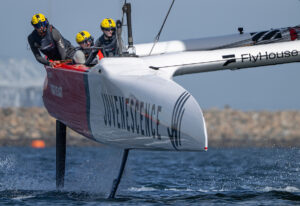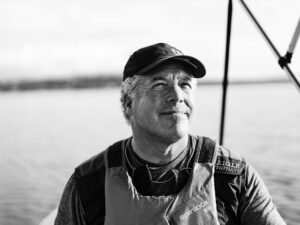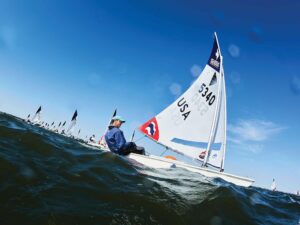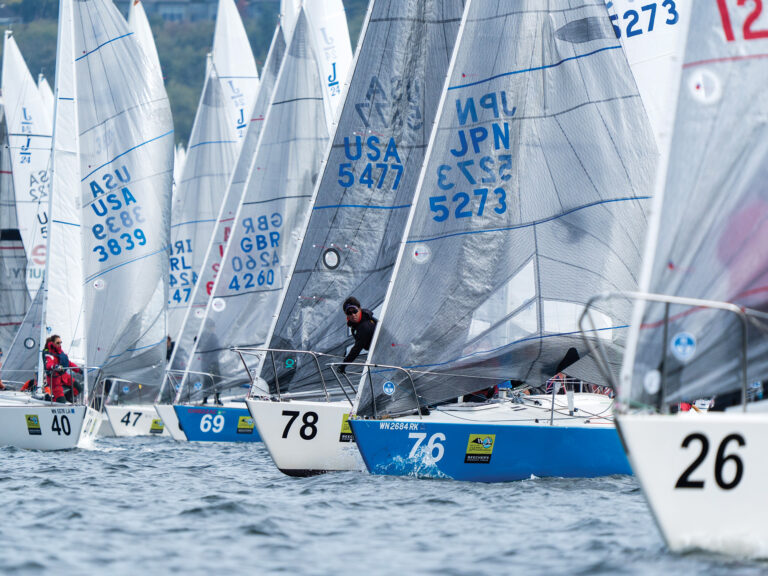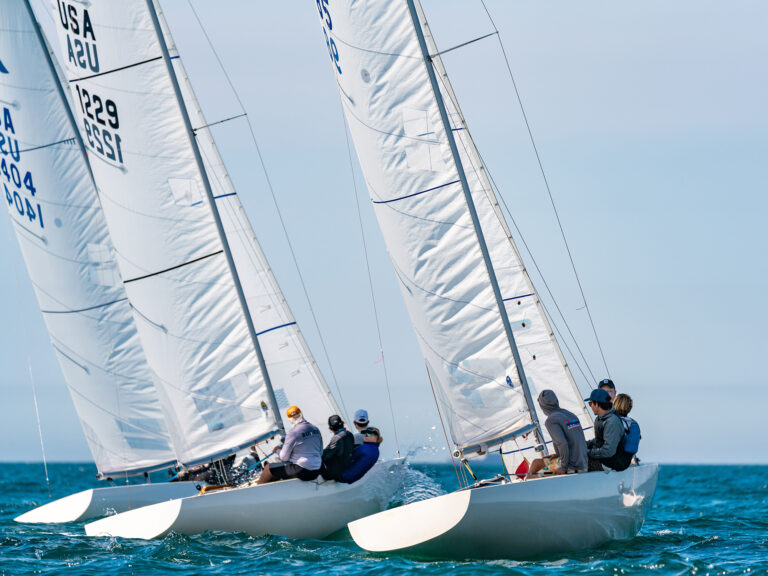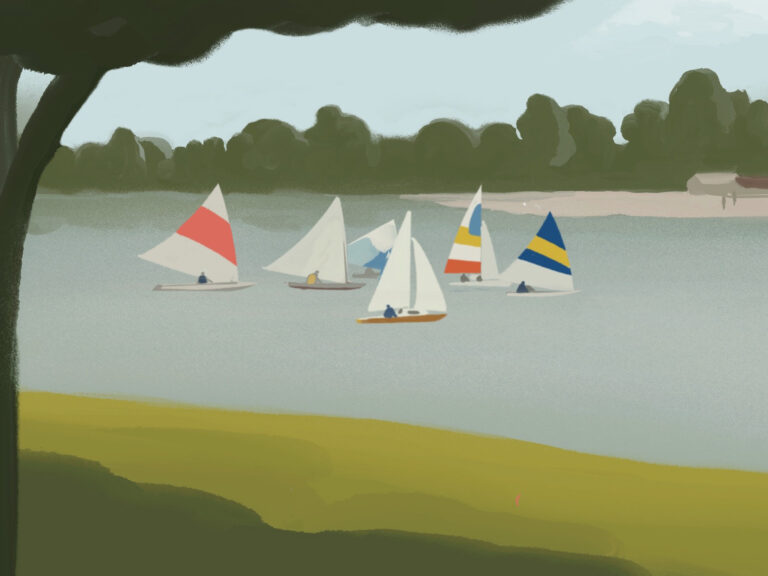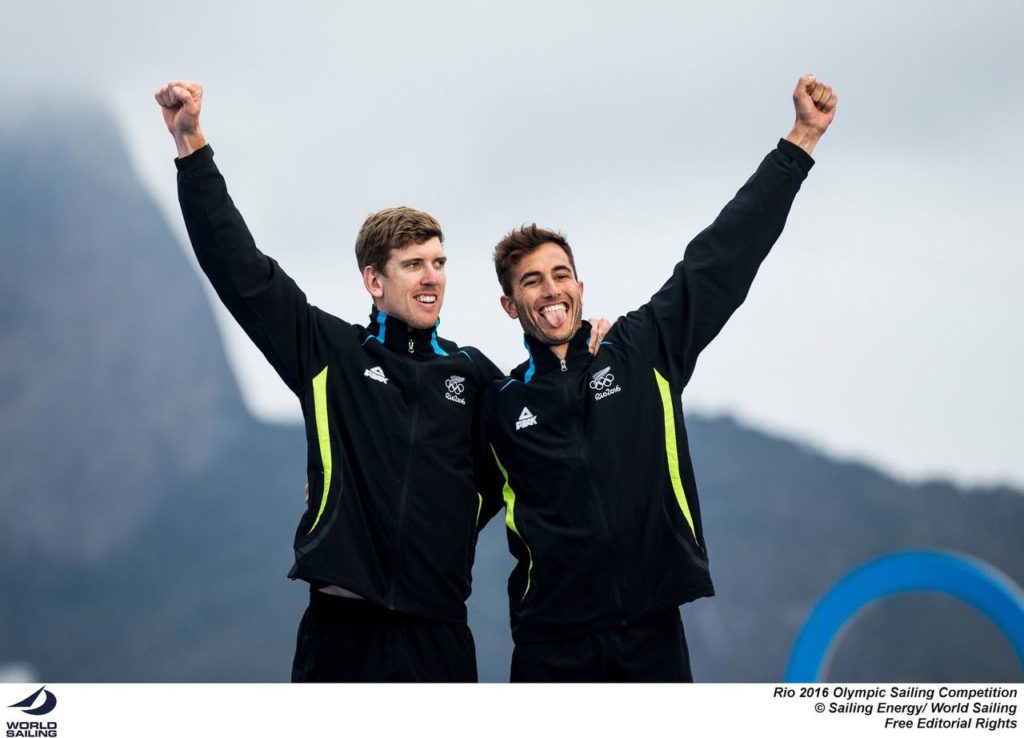
Peter Burling and Blair Tuke
Pressure effects people in different ways. When current Rolex World Sailors of the Year, New Zealand’s Peter Burling and Blair Tuke, arrived at the Rio 2016 Olympic Games they were far and away clear favourites to take the 49er gold with a quite astonishing four year run of results. And while others collapse under the pressure of being tagged as favourites, it just didn’t register with the Kiwi boys. They took gold with two races to spare.
But the confidence that they took in to the Games did not come around through luck, it was a result of hard work and mastering the skiff in all conditions which built up the one thing that every sports team strives for, that air of invincibility that gives a team an edge over their competitors before a regatta has even begun.
The pair started the 2016 Rolex World Sailor of the Year period with a win in the South American Championship, quickly followed by the 2015 49er world title. The 2016 world title was ticked off next. Then the 2016 European title. The Sailing World Cup Hyeres title followed. Kieler Woche carried on the run. The titles just kept on coming. But then disaster, although a disaster for Burling and Tuke isn’t the same as a disaster for the rest of us.
A bronze in the South American Championships sailed in the waters of the Rio 2016 Olympic Games just a month before they took a tilt at the gold medal they had set their sights on and worked so hard towards. It was the first time in four years the ‘invincibles’ had tasted defeat in the Olympic class.
The question was, how would they respond to finishing anywhere other than on the top step of the podium? Burling and Take answered in their synonymous cool, calm and collected style, domininating the fleet to claim the coveted gold with races to spare.
The nomination for Burling and Tuke isn’t just all about the Olympic classes either, despite the obvious dominance. The pair are an integral part of Emirates Team New Zealand’s challenge for the America’s Cup. Balancing an Olympic campaign and the Louis Vuitton America’s Cup World Series has only further strengthened their tags as ‘sailing’s hottest properties’.
Sandwiched between two 49er event wins in Europe, Burling and Tuke notched up an America’s Cup World Series win in New York, USA in spectacular fashion. With Burling at the helm and their catamaran stuck on the starting buoy’s anchor line, partner in crime Tuke jumped in to the water to unhook before climbing back onboard and helping the team to race and series victory.
Seemingly in sync with one another, Burling and Tuke continue to impress on the world sailing stage and are undoubtedly a formidable partnership.
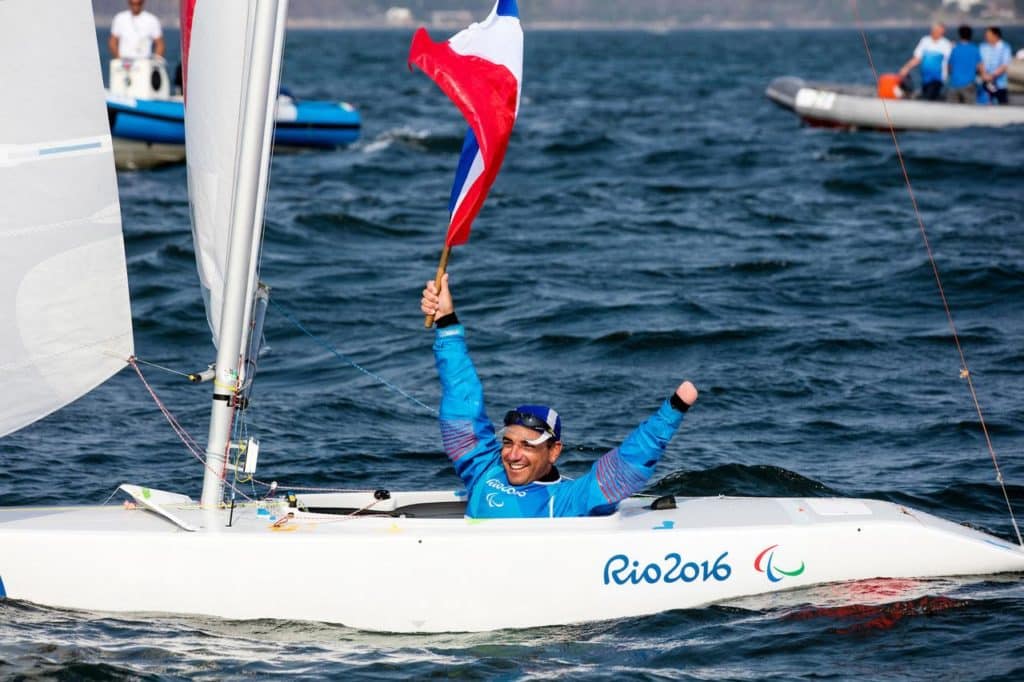
Damien Seguin
When the choice is to win a gold medal or inspire the next generation of sailors in your country and you pick the latter, it goes some way to explain the character of a person. Fortunately for France’s Damien Seguin he killed two birds with one stone, and it couldn’t have been more deserved.
Born with only one hand, Seguin is never one to make excuses of his disability. Quite the opposite. He harbours ambitions of being the first skipper with a disability to complete the Vendee Globe, but on his terms. No changes, no adaptations, no exceptions, no excuses. The best sailor wins.
That philosophy is how he approaches every regatta. If he is the best, he will win. And win he did as the nomination period started with the Para World Sailing Championship title and Sailing World Cup double in Melbourne, Australia at the end of 2015.
In a class jam packed with multiple world champions, Paralympic champions and Sailing World Cup winners, Seguin was on the podium at both Sailing World Cup Hyeres and the 2016 Para Worlds in Medemblik, the Netherlands in the run up to the Rio 2016 Paralympic Games.
The time had come. Chasing a third Paralympic medal Seguin stayed in contention at the top of the fleet in every race. As the pressure grew and sailors around him began to falter, the always relaxed Seguin continued to sail the only way he knew how. Cool, calm, collected and in contention.
With sailors and friends from his disabled sailing association in France making the journey to Brazil to line the shore and support their star, Seguin could not and would not disappoint. He had guaranteed himself another Paralympic medal with one race to go, but he wanted that gold.
In the final race Seguin kept the only sailor that could challenge him, the London 2012 Paralympic champion Helena Lucas, behind him. The gold and the inspiration he craved was his.
Ironically, before a Rio 2016 race even started, Seguin had that inspiration already, but such is his humble nature he is the only one that couldn’t see it. Seguin is the type of person that will say the gold is for all those that have helped him and that he has inspired, but for everyone else, that gold was just for him, he had earned it.
Bigger things are to come for the ever pleasant and courteous Seguin, but inspiration is his now.
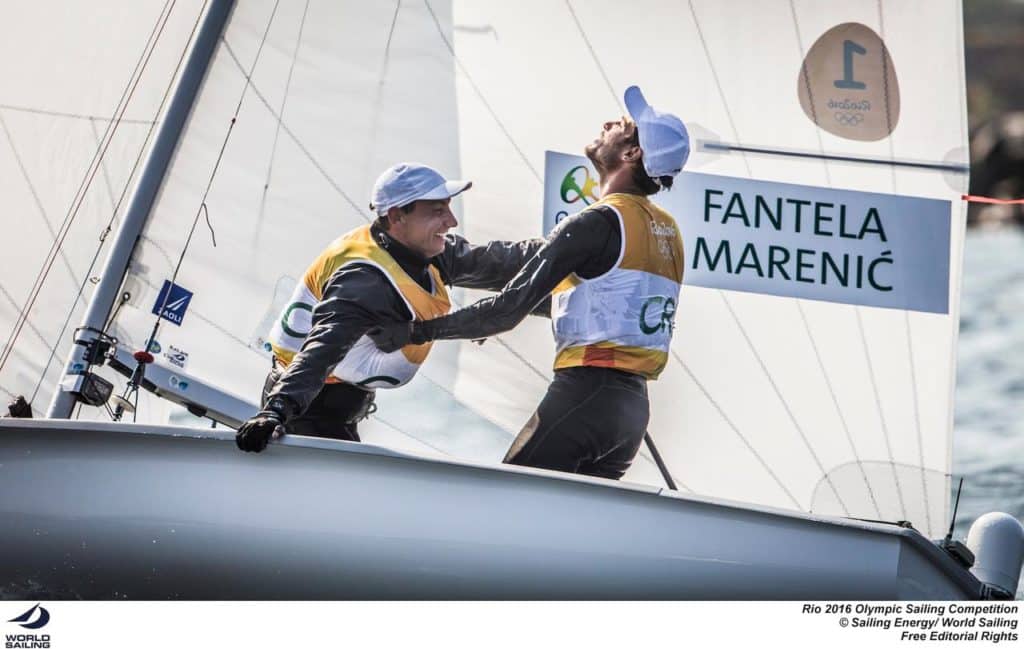
Sime Fantela and Igor Marenic
Sports commentators can often be heard using the phrase ‘they have peaked at the right time’. When Sime Fantela and Igor Marenic arrived at Rio 2016 you must have been able to hear the famous phrase in hushed tones. Come medal time, it was being shouted as they took the first ever Olympic sailing gold medal for Croatia in the Men’s 470.
In a slow start to the nomination period, Fantela and Marenic finished 13th in the 470 South American Championship in San Isidro, Argentina. But that was just lulling their rivals in to a false sense of security.
Immediately after and in the same waters of San Isidro, the pair took the lessons learned and applied them to halt the run of great class rivals, Australia’s Mat Belcher and Will Ryan’s run of world titles by taking the 2016 championship.
Falling just outside the medals in the European Championships, the ‘peaking’ began. A win at the Sailing World Cup Hyeres was followed by another Sailing World Cup win, this time at Weymouth and Portland.
Fantela and Marenic must have been brimming with confidence going in to the Rio 2016 Olympic Games, although with their humble personalities they would never show it. The long-time friends displayed measured and consistent sailing at a challenging venue to rise above a strong fleet and claim Croatia’s first ever Olympic sailing gold medal. If not for scheduling they would have also boasted Croatia’s first ever Olympic sailing medal, but compatriot Tonci Stipanovic beat them by a mere 24 hours. But that could not change the fact they will now forever be known as Olympic champions.
Although their sailing had peaked at the right time, their friendship continues to peak and undoubtedly parallels their success. As their friendship grows, so does the medal count.
The seeds of success were sown at a young age for the Croatian duo when Marenic moved in with Fantela’s family. At that point a friendship and plot for Olympic success emerged. Growing up with a dominant Australian 470 team who, even with crew changes, were showing no signs of slowing down, the pair had to reach a high level of performance, and more importantly maintain that level when it counted most. In 2016 Fantela and Marenic reached that level and wouldn’t let go until they could call themselves world and Olympic champions. They had peaked at the right time.
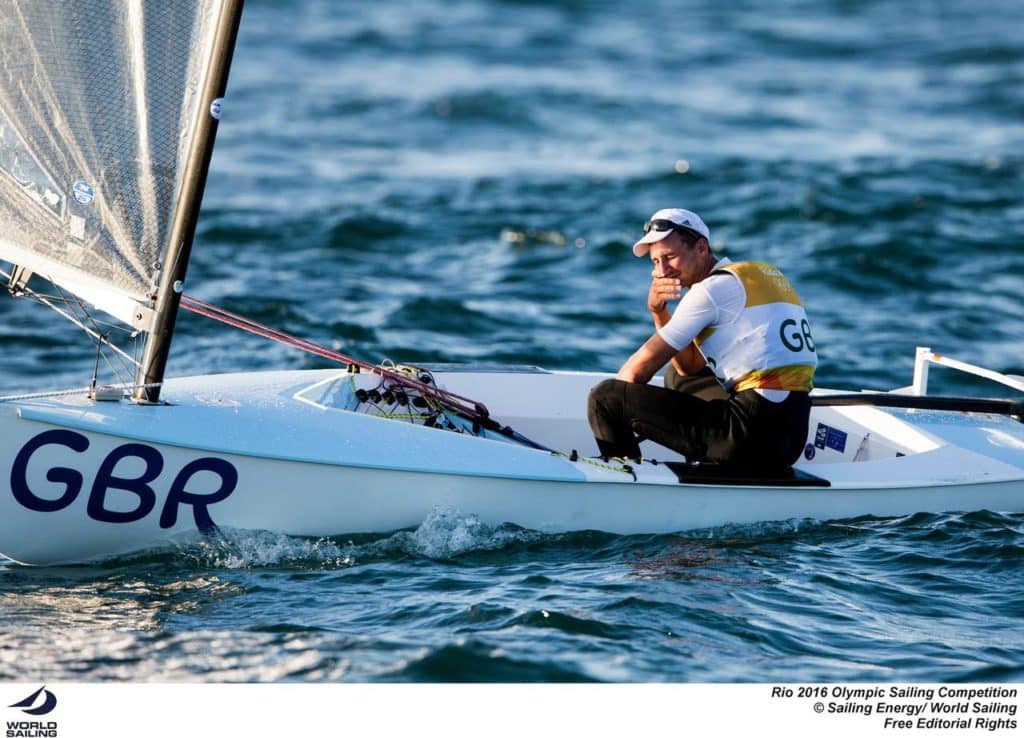
Giles Scott
Turning up to an event as favourite always adds that little bit of pressure. When you come from a country that has dominated a class and are following in the footsteps of one of the greatest ever Olympic sailors, it somewhat multiples that pressure. That was the unenviable task that Great Britain’s Giles Scott had to deal with and he passed the test with flying colours.
As part of the Land Rover BAR America’s Cup team with compatriot and five-time Olympic medallist Sir Ben Ainslie, Scott was juggling an Olympic campaign with sailing in the America’s Cup World Series throughout the nomination period.
Stepping out from the shadow of Ainslie and entrusted with the Finn Olympic crown, Scott had to perform or else face heading back home and telling his friend and team mate he had dropped the Olympic baton for his country. This was not an option.
Carrying on in his so far impressive Olympic pursuit which was littered with titles, Scott claimed the Finn Gold Cup in Takapuna, New Zealand at the end of 2015 before a second place at the Trofeo SAR Princesa Sofia, the first time he had not been on the top step of the podium since April 2013.
Scott was however back to winning ways in Gaeta, Italy as he secured yet another Finn Gold Cup before he took gold in his home waters of Weymouth and Portland at the Sailing World Cup. It was a winning goodbye to his homeland before he had to move on to Rio 2016, and the cauldron of the Olympic Games.
Every single Finn sailor in Rio de Janeiro knew Scott was the one to beat. He had a target on his chest for the whole fleet to aim at, the pressure was on.
Down to business, Scott steamed ahead of the fleet and secured the Finn Olympic gold in a style that even his predecessor Ainslie couldn’t manage. He had won with a race to spare. If you are going to continue on a country tradition and win gold, you do it in style and step out of the shadows of those before to cast your own.
Usually reserved and business like in his regatta wins, Scott crossed the Rio 2016 finish line with gold secured and the pressure valve was released. What lay beneath the surface was a character bursting with both self and national pride, safe in the knowledge he could return home, and to Land Rover BAR HQ, with his head held high and a gold medal around his neck.
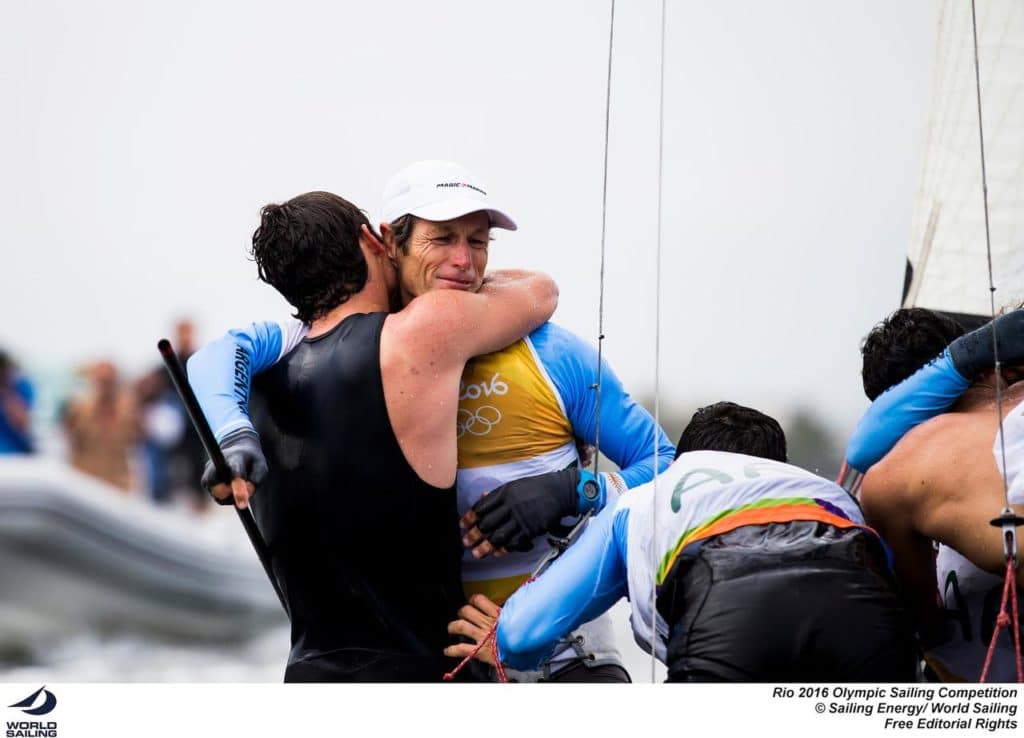
Santiago Lange
With age comes experience. He’s been there and done it. It couldn’t happen to a nicer guy. No one would begrudge him the win. He commands respect.
There are so many clichés that could be thrown around to describe Argentina’s Santiago Lange. And while they all apply, Lange will be the first person to ignore them and say he doesn’t deserve the accolades he has received since winning Rio 2016 Nacra 17 gold, but quite simply, he does.
An instantly likeable person, his down to earth demeanour and gentle persona defy the racer inside that fuelled an Olympic challenge. And it wasn’t just any old campaign. It was one dogged by health issues and counteracted with determination and strength.
A year out from the first Olympic Games on his home continent, Lange’s dream hit a stumbling block. He received the news that no one wants to hear, never mind someone in the midst of a rigorous Olympic campaign on the physically demanding Nacra 17. Lange had cancer.
With a lung removed and the cancer under control, Lange used the one thing he loved more than sailing to get back to fitness. His family. With sons Klaus and Yago competing in the 49er class, Lange regained his strength and stamina with some good healthy competition in the gym and out cycling with his two boys. As well as fitness, there was family bragging rights at stake.
Back up to speed health wise, Lange returned to competition with Cecilia Carranza Saroli in the mixed class. Top place finishes were hard to come by upon his return with the Australians and French taking a stranglehold on the fleet. But that only made the underdog story all the more real.
In the first Olympic outing for the Nacra 17, Lange used his experience, something often underrated in Olympic sailing, to control the field and build a score that edged him closer, day by day, to the coveted gold medal.
The Rio 2016 Medal Race seemed to encapsulate and echo a four-year journey for the Argentinean. Struggle, determination and then success. Lange and Carranza Saroli survived two penalties and fought up to sixth place to claim the gold medal by a single point.
In an outburst of emotion, quite fittingly shared with his sons who had swum to meet their champion father and partner, Lange drank in every moment. There was a happy ending to the fairy tale story of the Olympic Games.

